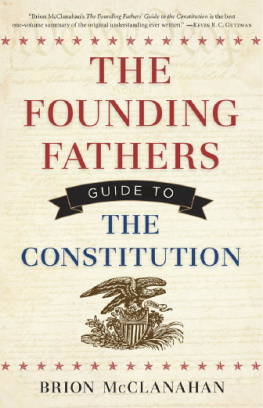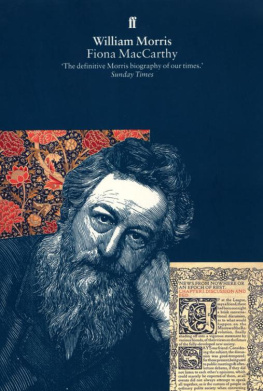Gentleman Revolutionary
GOUVERNEUR MORRIS
THE RAKE
WHO WROTE
THE CONSTITUTION
RICHARD BROOKHISER

Free Press
New York Toronto London Sydney Singapore
ALSO BY RICHARD BROOKHISER
Americas First Dynasty: The Adamses, 1735-1918
Alexander Hamilton, American
Rules of Civility
Founding Father: Rediscovering George Washington
The Way of the WASP
The Outside Story

Free Press
A Division of Simon & Schuster, Inc.
1230 Avenue of the Americas
New York, NY 10020
Copyright 2003 by Richard Brookhiser
All rights reserved, including the right of reproduction in whole or in part in any form.
FREE PRESS and colophon are trademarks of Simon & Schuster, Inc.
For information regarding special discounts for bulk purchases, please contact Simon & Schuster Special Sales at 1-800-456-6798 or business@simonandschuster.com
Designed by Chris Welch
Manufactured in the United States of America
1 3 5 7 9 10 8 6 4 2
Library of Congress Cataloging-in-Publication Data is available
ISBN-13: 978-0-743-22379-9
eISBN-13: 978-1-4391-0408-8
www.SimonandSchuster.com
THIS BOOK IS DEDICATED TO KENNETH WALD
Acknowledgments
I would like to thank the staffs of the Library of Congress, the New York Public Library, the Special Collections of Rutgers University, and the Alderman Library at the University of Virginia, for their help with unpublished documents. Mary Ellen Jones of the St. Lawrence County Historical Association, and Russ Sprague gave me valuable information about Gouverneur, New York. The Reverend Martha Rollins Overall, priest of St. Anns Church of Morrisania, kindly showed me the church Gouverneur Morris II built and the graves of his parents.
Linda Bridges, Alan Pell Crawford, Charles Kesler, Susan Shapiro and David Zincavage gave useful assistance. I am especially grateful to Forrest and Ellen McDonald. City Journal and its editor, Myron Magnet, let me write a piece about my great New Yorker. My wife, Jeanne Safer, let me have a wonderful line about the skins of the eighteenth-century poor.
I would like to thank my editor, Bruce Nichols, and my agent, Michael Carlisle.
Contents
A Note on Money and Spelling
I have tried to provide islands of modern value in the rush of currency that flowed through Morriss life as a private businessman and a public financier. In his youth the American colonies kept their accounts in pounds, with 20 shillings to the pound and 12 pence to the shilling. (The pound sterling of England was worth almost twice as much as any of the colonial pounds.) But the most common colonial coin was the Spanish dollar, which was worth 4 shillings 6 pence sterling, or about 8 colonial shillings. The pre-revolutionary French livre (equal to 20 sous) was worth about 9 pence sterling. Morris lived through several periods of inflation, at home and abroad.
English was spelled and punctuated differently in Morriss lifetime. Eighteenth-century capitalizing survives in the Constitution: We the People of the United States, in Order to form a more perfect Union My compromise between readability and period flavor has been to modernize most of the punctuation, and to leave most of the spelling in its original form.
Introduction
A BIOGRAPHER can feel a moments hesitation when it comes to introducing his subject, for every traditional means has its drawbacks. If the hero appears in medias res, in the midst of some great action, the reader may feel manipulated, even coerced: his attention is being claimed before it has been earned. If the story of a life begins where the life does, in a cradle, then the reader might experience a sense of delay: he wished to read about great men, not infants. For the biographer of Gouverneur Morris, it is perhaps best to let him be introduced by a woman.
In 1795, Harriet de Damas, a French countess, wrote a portrait of a tall, handsome American who had become a fixture of Parisian society. watched him; he watched himself, mindful of the impression he made.
Superficial observers, wrote Mme de Damas, might be acquainted with Mr. Morris for years, without discovering his most eminent qualities. Such observers must be told what to admire. The Frenchwoman confronts a difficulty with her portrait head-on: she had known Mr. Morris for only a small part of his life, since his first thirty-seven years had been spent in America. But she plunged ahead confidently.
The superficial observers of his early life regard Mr. Morris as a profound politician, and indeed he had been involved in politics, often of the most eventful kind. When he was twenty-three years old the American Revolution began, and he watched it pull society and family asunder (one of his elder half brothers signed the Declaration of Independence; another half brother was a general in the British army). He left American towns a step ahead of marauding British armies, and when Morris visited his mother, who supported the crown throughout the war, he had to get passes from both sides to cross their lines. He eventually followed his patriot half brother into the Continental Congress, where he helped accomplish great things, but also engaged in endless petty wrangling. (We had many scoundrels in Congress, he would remember as an older man.)
When he was still a young one, age thirty-five, Mr. Morris drafted the Constitution of the United States. The proceedings of the Constitutional Convention were secret, to allow the delegates maximum freedom to speak their minds, so Mr. Morriss role on the Committee of Style was not generally known. But in later years he admitted to a correspondent that that instrument was written by the fingers which write this letter.
Mme de Damas and her French friends certainly knew about Mr. Morriss political activity: it was one facet of his social cachet, a point of interest like his wardrobe and his leg. A more striking feature of their friend was his manner. Mme de Damas called him the most amiable of men. His imagination inclines to pleasantry, and being abundantly gifted with what the English call humor, united to what the French name esprit, it is impossible not to be delighted. Humor and esprit : Mr. Morris delighted in the incongruities and follies of life, including his own, and his comments-quick, shapely, and bold-communicated that delight to others. Women found him especially pleasing, perhaps because he took special pains to please them. Govr Morris kept us in a continual smile, was how one young lady put it. His women friends did more than smile. At the cardtable of the sexes, his wit and looks always trumped his disability, and the one-legged American left a trail of lovers on two continents.
Mr. Morriss good company went beyond good times. When the French Revolution, more stressful than the American, began to suck his glittering friends into poverty, exile, and danger, he gave many of them refuge, and saved several of their lives. Mme de Damas was not one of his lovers, but he did save her life.
But more important than Mr. Morriss career or his behavior was his nature. Nothing really worthy of him, wrote Mme de Damas, will be said by any one, who does not ascend to the source of all that is great and excellent in his character. That, she decided, was a belief that God can will nothing but what is good. This gave him confidence, charity, and hope. Ever at peace with himself seldom ruffled in his temper, not suffering men or events to have a mastery over his spirit, he is habitually serene, alike ready to engage in the most abstruse inquiries, or to join in the trifles of social amusement. Gouverneur Morris took his life as it came. He conceives it to be following the order of Providence to enjoy all its gifts. To enjoy is to obey. And upon the same principle he submits, with a modest fortitude, and sincere resignation, to the ills inflicted by the same hand. Living among tottering thrones and shaky republics, Mr. Morris showed the gift of poise.







